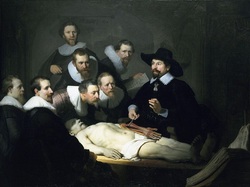 The Anatomy Lesson of Dr. Nicolaes Tulp. Rembrandt The Anatomy Lesson of Dr. Nicolaes Tulp. Rembrandt Medicine, according to Hippocrates, consists of three things – “the disease, the patient and the physician.” But what is disease? It is not simply a state of less than optimum physical health. As Charles Rosenberg says in the introduction to a set of essays on this subject: “In some ways a disease does not exist until we have agreed that it does by perceiving, naming and responding to it." In cardiology there are two diseases which have only been recently “framed." They are Brugada syndrome and Takotsubo cardiomyopathy. Brugada syndrome was first described in 1992 by the Brugada brothers. They reported the case of a child with recurrent episodes of ventricular fibrillation who had an abnormal pattern of right bundle branch block with ST elevation in the right precordial chest leads. Once this pattern had been described cardiologists looked back to patients they had been managing who were survivors of ventricular fibrillation and people with cardiac defibrillators and found that some of them also had this ECG pattern. Brugada syndrome had existed before this but was simply not recognised by mainstream cardiologists. The syndrome is commonly seen in young men originating from the Far East. In the Thai medical literature, long before the Brugada's description, doctors had described sudden adult death syndrome which was associated with night-time in episodes of ventricular fibrillation which had been called Lai Tai. Most victims were apparently otherwise healthy young men who died unexpectedly during sleep. In some families, similar deaths had occurred for over four generations. It was a local myth that these unexplained deaths were caused by a widow ghost who came to take the mens’ soul at night. It was tradition in some parts of Thailand for men to dress in women’s nightclothes to confuse the ghosts! In other countries similar syndromes were described including Tsob Tsuang in Vietnam and bangungut in the Philippines. Elsewhere the concept of "Voodoo Death" has been well described and may well be related to a cardiac arrhythmia. Another disease recently framed is the Takotsubo cardiomyopathy, also described first in the Far East this time in Japan. It is an unusual form of cardiomyopathy which is usually seen in women and often triggered by a severe emotional disturbance. It is characterised by chest pain and usually patients are usually thought to have an acute coronary syndrome. The first reports of this disease came from Japan possibly because this country is in an earthquake zone and earthquakes provoke severe emotional disturbances. Also Japan has a primary angioplasty service and the Takotsubo diagnosis is usually made when patients are studied in the catheter laboratory. This is because the coronary arteries are unobstructed and there is often a classical appearance of apical ballooning on the LV gram. This syndrome occurs reasonably commonly in clinical practice and until recently was simply not recognised. These two cardiac conditions have only recently been framed as diseases. In the past we would have simply labelled the patients as having idiopathic ventricular fibrillation or an acute coronary syndrome without obstructive coronary disease. I wonder how many other diseases there are waiting to be framed.
0 Comments
|
Dr Richard BogleThe opinions expressed in this blog are strictly those of the author and should not be construed as the opinion or policy of my employers nor recommendations for your care or anyone else's. Always seek professional guidance instead. Archives
August 2023
Categories
All
|
 RSS Feed
RSS Feed

